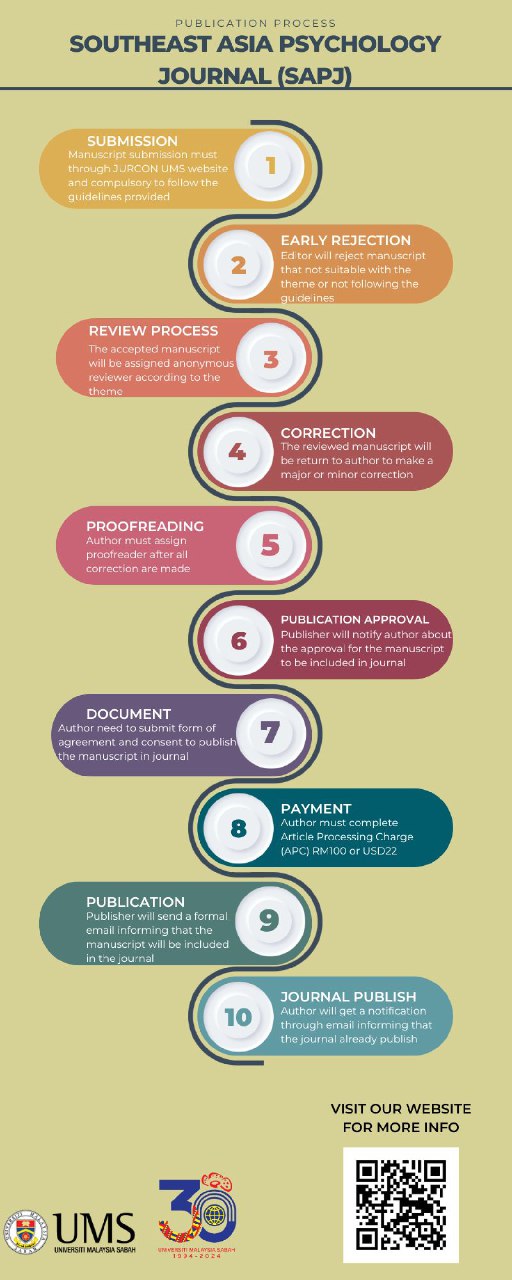RELIABILITY AND VALIDITY MEASUREMENT OF EMOTIONAL INTELLIGENCE, SELF-COMPASSION AND PSYCHOLOGICAL WELL-BEING AMONG NGO VOLUNTEERS
DOI:
https://doi.org/10.51200/sapj.v12i2.5625Keywords:
Reliability, Validity, Psychological Well-beingAbstract
Reliability and validity are important components to be focused on in conducting research. According to previous research, psychometric properties of emotional intelligence, self-compassion and psychological well-being not widely tested by the sample of volunteers. The aim of this study is to examine the reliability and validity for three instruments: Emotional Competence Inventory (ECI), Self-compassion Scale (SCS) and Scale of Psychological Well-being (SPWB). This study is conduct using quantitative research design by using questionnaires. There were 377 volunteers of NGO in Sabah involved as sample in this study. The data was analyzed by Statistical Packages for Social Science (SPSS) version 29. Results show that the score of Cronbach’s alpha for ECI is 0.972; while for SCS is 0.848 and for SPWB is 0.764. The results show that three instruments used in this study are reliable. Meanwhile for validity, the correlation coefficients between each subscales and overall scores of ECI components or the value of r, vary from 0.907 to 0.973, showing statistical significance at a level of p<0.05. For instrument SCS, the value of r for the subscales are between 0.488 and 0.773 with the p<.05. While for SPWB, the value of r of every subscales are between 0.574 and 0.823 with the p<.05. In conclusion, the three instruments used in this research show the value of r of all items very beneficial and strongly valid. All of the items from these three instruments remain. The implication of this study is that the findings could serve as a reference to future works for researchers that are interested in measurement studies of emotional intelligence, self-compassion and psychological well-being, especially in volunteer context.
References
Abd Hamid, H. S., Saleh, B. S., Azmi, F., Doan, H. T., Jing, L. X., Yee, L. J., & Jie, Y. S. (2019). Validation of the self-compassion scale in a malaysian sample. International Journal of Education, 4(25), 22-32. Retrieved from http://www.ijepc.com/
Adey, N. H. B. (2015). Hubungan antara kecerdasan emosi dengan kepuasan kerja dan komitmen organisasi dalam kalangan guru di sekolah menengah. [Master’s thesis, Universiti Malaysia Sabah].
Adha, M. M., Budimansyah, D., Kartadinata, S., & Sundawa, D. (2019). Emerging volunteerism for Indonesian millennial generation: Volunteer participation and responsibility. Journal of Human Behavior in the Social Environment, 29(4), 467-483. https://doi.org/10.1080/10911359.2018.1550459
Akin, A. (2008). The scales of psychological well-being: a study of validity and reliability. Educational sciences: Theory and practice, 8(3), 741-750. Retrieved from https://files.eric.ed.gov/fulltext/EJ837765.pdf
Ali, S. B., Khan, N. A., & Zehra, A. (2016). Effect of volunteerism on mental health and happiness. International Journal of Humanities and Social Sciences, 5(2), 123-130. Retrieved from https://www.iaset.us/search?sname=EFFECT+OF+VOLUNTEERISM+ON+MENTAL+HEALTH+AND+HAPPINESS+&stype=2&jtype=2&submit=Search
Amira, W., Abd R, M. A., & Fatimah, Y. (2016). Kecerdasan emosi dan motivasi kerja dalam kalangan subordinat MARDI. Jurnal Psikologi Malaysia, 30, 52-60. Retrieved from https://spaj.ukm.my/ppppm/jpm/article/view/155/168
Beato, A. F., da Costa, L. P., & Nogueira, R. (2021). “Everything is gonna be alright with me”: The role of self-compassion, affect, and coping in negative emotional symptoms during coronavirus quarantine. International journal of environmental research and public health, 18(4), 2017. https://doi.org/10.3390/ijerph18042017
Birmingham, P., & Wilkinson, D. (2003). Using research instruments: A guide for researchers. Routledge.
Boyatzis, R. E., Goleman, D., and Rhee, K. (2000). Clustering competence in emotional intelligence: Insights from the Emotional Competence Inventory (ECI)s. In R. Bar-On and J.D.A. Parker (eds.), Handbook of emotional intelligence. San Francisco: Jossey-Bass, pp. 343-362.
Bueno, J. M. H., Correia, F. M. D. L., & Peixoto, E. M. (2021). Psychometric properties of the emotional competence inventory-short revised version (ECI-R). Psico-USF, 26, 519-532. http://dx.doi.org/10.1590/1413-82712021260310
Bukhari, S. A. R. (2020)."Bukhari sample size calculator." Research gate gmbh . http://dx.doi.org/10.13140/RG.2.2.11445.19687
Cho, H., Wong, Z. E., & Chiu, W. (2020). The effect of volunteer management on intention to continue volunteering: A mediating role of job satisfaction of volunteers. Sage open, 10(2), https://doi.org/10.1177/2158244020920588
Drost, E. A. (2011). Validity and reliability in social science research. Education Research and perspectives, 38(1), 105-123. Retrieved from https://www.researchgate.net/publication/261473819_Validity_and_Reliability_in_Social_Science_Research
Faletehan, A. F., van Burg, E., Thompson, N. A., & Wempe, J. (2021). Called to volunteer and stay longer: The significance of work calling for volunteering motivation and retention. Voluntary Sector Review, 12(2), 235-255. https://doi.org/10.1332/204080520X15929332587023
Figley, C., R., (1995). In Cañas‐Lerma, A. J., Campos‐Vidal, J. F., & Verger, S. (2022). “Our focus is on illness and loneliness”: Volunteer work engagement, compassion satisfaction, compassion fatigue, self‐care and motivations to volunteer. Health & Social Care in the Community, 30(6), e6631-e6644. https://doi.org/10.1111/hsc.13934
Garcia, D., Kazemitabar, M., & Asgarabad, M. H. (2023). The 18-item Swedish version of Ryff’s psychological wellbeing scale: psychometric properties based on classical test theory and item response theory. Frontiers in psychology, 14, 1208300.
Goetz, J. L., Keltner, D., & Simon-Thomas, E. (2010). Compassion: an evolutionary analysis and empirical review. Psychological bulletin, 136(3), 351. https://psycnet.apa.org/doi/10.1037/a0018807
Hay Group (2005) Emotional Competence Inventory (ECI) Technical Manual. Steven B. Wolff, Bos-ton. Retrieved from https://www.eiconsortium.org/pdf/ECI_2_0_Technical_Manual_v2.pdf
Kandel, B. 2020. Qualitative versus Quantitative Research. Retrieved from https://www.researchgate.net/publication/352550744_Qualitative_Versus_Quantitative_Research
Khasanzyanova, A. (2017). How volunteering helps students to develop soft skills. International Review of Education, 63, 363-379.
Khatib, N. A. M., Hoesni, S. M., & Manap, J. (2018). Kesahan dan kebolehpercayaan instrumen Skala Belas Kasihan Kendiri (SBKK) versi Bahasa Melayu. Jurnal Psikologi Malaysia, 32(3). Retrieved from https://spaj.ukm.my/ppppm/jpm/article/view/409
Krejcie, R. V., & Morgan, D. W. (1970). Determining sample size for research activities. Educational and Psychological Measurement, 30(3), 607–610. https://doi.org/10.1177/001316447003000308
Leong, J. J. (2019). Penilaian Psikometrik Inventori Kecekapan Emosi (versi Bahasa Melayu) Melalui Kaedah PLS-SEM. Borneo International Journal eISSN 2636-9826, 2(1), 26-37.
Lin, D. T., Liebert, C. A., Tran, J., Lau, J. N., & Salles, A. (2016). Emotional intelligence as a predictor of resident well-being. Journal of the American College of Surgeons, 223(2), 352-358. https://doi.org/10.1016/j.jamcollsurg.2016.04.044
Lorente-Ayala, J. M., Vila-Lopez, N., & Kuster-Boluda, I. (2020). How can NGOs prevent volunteers from quitting? The moderating role of the NGO type. Management Decision, 58(2), 201-220. https://doi.org/10.1108/MD-04-2019-0531
Matthews, K., & Nazroo, J. (2021). The impact of volunteering and its characteristics on well-being after state pension age: Longitudinal evidence from the English Longitudinal Study of Ageing. The Journals of Gerontology: Series B, 76(3), 632-641. https://doi.org/10.1093/geronb/gbaa146
Mehmood, T., & Gulzar, S. (2014). Relationship between emotional intelligence and psychological well-being among Pakistani adolescents. Asian Journal of Social Sciences & Humanities, 3(3), 178-185. Retrieved from http://www.ajssh.leena-luna.co.jp/ajsshvol3n3.php
Mohajan, H. K. (2017). Two criteria for good measurements in research: Validity and reliability. Annals of Spiru Haret University. Economic Series, 17(4), 59-82. http://dx.doi.org/10.26458/1746
Mohd Salleh, N.H., (2022, Apr 10). NGO boom for charity or profit?. Malaysia Now. https://www.malaysianow.com/news/2022/04/10/ngo-boom-for-charity-or-profit
Monfared, J. H., & Derakhshan, H. (2015). The comparison qualitative and quantitative research. Indian journal of fundamental and applied life sciences, 5(2), 1111-1117. Retrieved from http://www.cibtech.org/sp.ed/jls/2015/02/jls.htm
Neff, K. D. (2003). Self-Compassion: An Alternative Conceptualization of a Healthy Attitude Toward Oneself. Self and Identity, 2(2), 85–101. https://doi.org/10.1080/15298860309032
Neff, K. D. & Germer, C. (2017). Self-Compassion and Psychological Wellbeing. InJ. Doty (Ed.) Oxford Handbook of Compassion Science, Chap. 27. Oxford UniversityPress.
Neff, K. D., & Tóth-Király, I. (2022). Self-compassion scale (SCS). In Handbook of assessment in mindfulness research (pp. 1-22). Cham: Springer International Publishing.
R Oktavia, Irwandi, Rajibussalim, M Mentari, & I S Mulia (2018). Assessing The Validity And Reliability Of Questionnaires On The Implementation Of Indonesian Curriculum K-13 In STEM Education. The 6th South East Asia Design Research International Conference. 10.1088/1742-6596/1088/1/012014
Rogerson, M., Barton, J., Bragg, R., & Pretty, J. (2017). The health and wellbeing impacts of volunteering with the wildlife trusts. University of Essex, Colchester.
Ryff, C. D., & Keyes, C. L. M. (1995). The structure of psychological well-being revisited. Journal of Personality and Social Psychology, 69(4), 719–727. https://doi.org/10.1037/0022-3514.69.4.719
Ryff, C. D. (2013). Psychological well-being revisited: Advances in the science and practice of eudaimonia. Psychotherapy and psychosomatics, 83(1), 10-28. https://doi.org/10.1159/000353263
S Afsana. (2016). A Study of Mental Health and Psychological Well Being among Teachers and Lecturers. International Journal of Indian Psychology 3 (3), DOI: 10.25215/0303.137, DIP: 18.01.137/20160303
Shukla, S., Adhikari, B., & Ray, M. (2016). Emotional Intelligence and Job Satisfaction: An Empirical Investigation. Amity global HRM review, 6. Retrieved from https://www.researchgate.net/publication/322976907_Emotional_Intelligence_and_Job_Satisfaction_An_Empirical_Investigation
Suis, S. N. F. B., Rusdy, M., & Fahrudin, A. (2017). The management and leadership of Non-Governmental Organizations in Sabah. Asian Social Work Journal, 2(1), 39-43. Retrieved from https://msocialwork.com/index.php/aswj/article/view/12
Surucu, L., & Maslakci, A. (2020). Validity and reliability in quantitative research. Business & Management Studies: An International Journal, 8(3), 694–726. http://dx.doi.org/10.15295/bmij.v8i3.1540
Thoits, P. A., & Hewitt, L. N. (2001). Volunteer work and well-being. Journal of health and social behavior, 115-131. https://doi.org/10.2307/3090173
Thompson, B. (2003). Understanding Reliability and Coefficient Alpha, Really. In B. Thompson (Ed.). Score Reliability: Contemporary Thinking on Reliability Issues. Thousand Oaks, CA: SAGE.
Westen, D., & Rosenthal, R. (2003). Quantifying construct validity: two simple measures. Journal of personality and social psychology, 84(3), 608. 10.1037/0022-3514.84.3.608
Wilson, J. (2000). Volunteering. Annual review of sociology, 26(1), 215-240. https://doi.org/10.1146/annurev.soc.26.1.215
Wispé, L. (1991). The psychology of sympathy. Springer Science & Business Media.
Zeike, S., Bradbury, K., Lindert, L., & Pfaff, H. (2019). Digital leadership skills and associations with psychological well-being. International journal of environmental research and public health, 16(14), https://doi.org/10.3390/ijerph16142628
Zohrabi, M. (2013). Mixed Method Research: Instruments, Validity, Reliability and Reporting Findings. Theory & practice in language studies, 3(2). 10.4304/tpls.3.2.254-262








